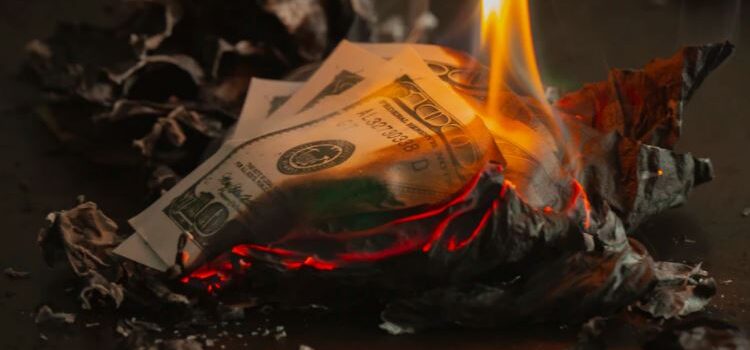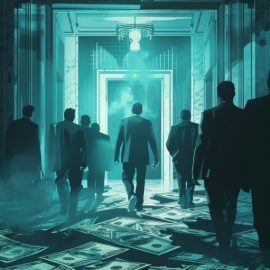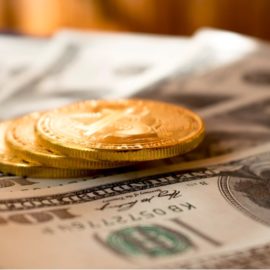

This article is an excerpt from the Shortform book guide to "Flash Boys" by Michael Lewis. Shortform has the world's best summaries and analyses of books you should be reading.
Like this article? Sign up for a free trial here .
What are dark pools? How does Michael Lewis, author of Flash Boys, think dark pools are being used in the stock market?
In Flash Boys, Lewis says that sending a stock order to a dark pool is a sneaky way for investors to profit off private orders. High-frequency (HF) traders have also found a way to use dark pools to their advantage.
In this article, we’ll go into more detail on what dark pools are and why HF traders are so interested in them.
What Are Dark Pools?
The rise of electronic trading allowed for the development of dark pools. But what are dark pools? Lewis defines dark pools as private stock exchanges set up by large banks. Investors send their orders to the brokers at these banks, and the bank routes the order to its dark pool to be fulfilled instead of looking for buyers or sellers in the wider market.
(Shortform note: While Lewis discusses dark pools as a relatively new market phenomenon, the first dark pool was started in 1979 due to a regulation that allowed securities listed on an exchange to be traded off the exchange, offering more privacy than the public exchanges. For the next 20 years, dark pool trading accounted for only 3-5% of trades—until electronic trading platforms made setting up a dark pool easier.)
Since dark pools are private, banks don’t have to immediately report to the public what happens inside them, which means they don’t show real-time market changes. Because of this, traders outside the dark pool have access to less information than traders within the dark pool, which enables the latter to not only move faster on pricing changes, but also to anticipate pricing changes, which they can then profit from.
Lewis explains that if a trader sells a large number of shares on the public market, the price naturally goes down since other traders would see the supply of that stock increase. If a trader sells a large number of shares in a dark pool, however, traders in the public market don’t see that sale happening, and so they don’t know that the price for that stock is about to decrease. This secrecy benefits the dark pool trader, who can sell the shares before the price drops on the public market, thus making more of a profit.
| Archegos: Dark Pool Secrecy Backfires on Risky Trading Experts note that the secrecy of dark pools Lewis describes can be beneficial by facilitating favorable prices for retirement accounts as they rise in value, thus helping people with 401(k) or pension accounts. But critics of dark pools argue that the lack of transparency is a problem and that dark pools aren’t being used for their intended purpose: to reduce market impact when placing large trade orders. Indeed, investors who abuse this secrecy can face serious consequences. Bill Hwang was arrested for fraud and racketeering in connection with his family firm, Archegos, after a risky investment strategy cost him $20 billion. Since Archegos was investing inside dark pools (so his large trades wouldn’t impact market prices), other banks and institutions weren’t aware of his trades or the terms of those trades, which may have deterred them from doing business with him or prevented him from building such a large market position. Regulators have expressed interest in implementing new disclosure rules to prevent this kind of trading activity. |
Dark-Pool Arbitrage
What is dark-pool arbitrage? Dark-pool arbitrage is when HF traders make money buying and selling stocks using the price differences between dark pools and other exchanges. Dark-pool arbitrage generates more than a billion dollars a year.
Banks aren’t required to immediately publish what goes on in their dark pool, or private stock exchange, thus allowing investors to trade more discreetly. But because they don’t immediately publish this information, there is a time lag between dark pools and public stock exchanges. Lewis explains that this time lag means dark pools are slow to reprice stocks when their values change on public stock exchanges, thus allowing HF traders to commit dark-pool arbitrage.
For example, say Jordan has an order to buy Tesla stock waiting in a dark pool. Then Tesla stocks decrease in value on the public markets from $300.00 to $299.99. A dark pool is slow to reprice Tesla’s stock from $300 to $299.99 on their exchange. An HF trader buys Tesla stocks on the public exchanges for $299.99 and sells them to Jordan at $300 before the dark pool reprices the stock to $299.99. Thus, Jordan loses money to the HF trader.
| European Regulations Discourage Dark-Pool Arbitrage In response to concerns about dark-pool arbitrage and misuse, US regulators are still exploring the possibility of dark-pool regulation, but European regulators responded more quickly by introducing MiFID II in 2018, which encouraged more transparency and expanded on existing stock regulations from 2007. Under MiFID II, only 8% of a stock’s average trading volume within a year can be completed in dark pools. The regulation also set minimum limits for the size of trades to exclude HF traders, who generally buy and sell small-sized orders, and encourage investors to use dark pools as originally intended: to allow investors to make large trades without impacting market prices. Experts note that these regulations have made dark-pool arbitrage less of a concern in their markets, which could provide a framework for US regulators. |
Selling Dark Pool Access
Banks also made money from selling access to their dark pool to HF traders, despite telling their customers dark pools were safe from HFT. Lewis explains that HF traders were willing to buy access because they could commit dark pool arbitrage, which generates more than a billion dollars a year. Selling dark pool access benefitted both HF traders and the firm at the expense of the individual investor, who (by nature of a dark pool) had no idea how the private trading worked.
So, when banks boasted that they had a large number of trades executed within their dark pool, the high number of transactions was often due to HF traders exploiting investors. (Shortform note: In 2018, the SEC attempted to address the issues Lewis outlines by passing new regulations for dark pools, forcing banks to be more transparent about completed trade prices, fees, matching processes, and whether or not other traders have priority in their dark pool system. While this was a good first step in regulation, the SEC has expressed interest in implementing further transparency and disclosure surrounding the nature of dark pool operations, indicating the issues it set out to address in 2018 have persisted.)

———End of Preview———
Like what you just read? Read the rest of the world's best book summary and analysis of Michael Lewis's "Flash Boys" at Shortform .
Here's what you'll find in our full Flash Boys summary :
- Why high-frequency trading (HFT) is a threat to your investments
- A look at Wall Street’s greedy response to HFT
- How Canadian trader Brad Katsuyama tried to fight the problem






